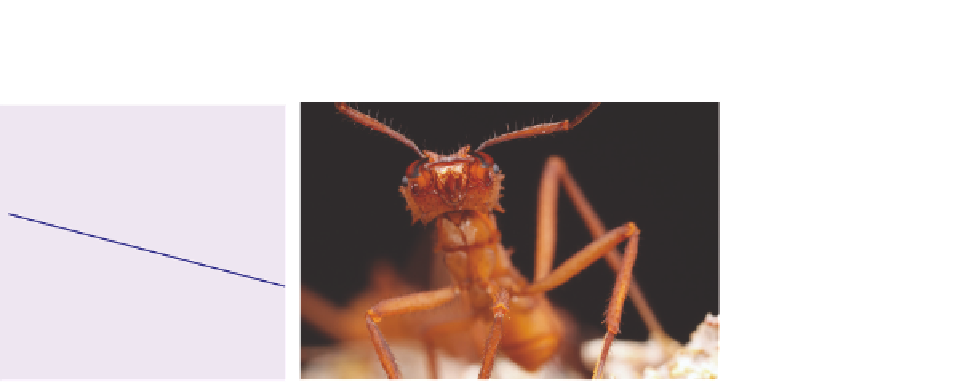Biology Reference
In-Depth Information
0.3
0.2
0.1
0.0
-0.1
-0.2
-0.3
-0.4
-0.5
-0.6
0
0.1
0.2
0.3
0.4
0.5
Relative relatedness to workers' versus
queen's sons contrasts
Fig. 13.15
Variation in level of worker policing across 48 species. Plotted are the
phylogentically independent contrasts in the level of worker policing behaviour against
the constrasts in relatedness to workers versus queens sons. Higher levels of worker
policing are observed in species where workers are less related to the sons of other
workers (nephews). From Wenseleers and Ratnieks (2006). With permission of the
University of Chicago Press. Photograph shows a worker of the leafcutter ant
Acromyrmex echinatior
, in which worker policing occurs. Photo © Alex Wild.
reduces the cost (
C
) of cooperating - direct reproduction would be failure, so you might
as well help. Wenseleers and Ratnieks (2006b) tested this hypothesis across ten bee and
wasp species where the effectiveness of policing had been estimated by measuring the
proportion of worker-laid eggs that were removed. As predicted, they found that the
proportion of workers who produced eggs was negatively correlated with the effectiveness
of policing (Fig. 13.16). In other words, policing can be an effective way to enforce
altruism amongst relatives because it decreases the relative cost of sterility!
These results do not suggest an alternative explanation for altruism to kin selection
because the reproductive altruism of the workers still relies on the fact that they are
helping raise relatives. Instead, they show how enforcement behaviours such as policing
can help favour cooperation or altruism by influencing the associated benefits (
B
) or
costs (
C
). In addition, the work on policing in the social hymenoptera illustrates the
general point that different factors can be involved in the evolution and maintenance of
behaviours. Eusociality initially evolved in species where queens mated singly, where
worker policing is not expected. Then, in lineages where multiple mating arose, this led
to worker policing, which could then play a role in maintaining eusociality.
Policing can help
select for altruism
…
… because it
increases the
relative kin
selected benefit
of helping
relatives
Superorganisms
Colonies of social insects are sometimes referred to as 'superorganisms' (Wilson &
Hölldobler, 2009). This is because the different members of the colony appear to be
behaving largely for the good of the colony as a whole, just as different cells in the body
of individual organisms act for the good of that individual organism. There are some



























































